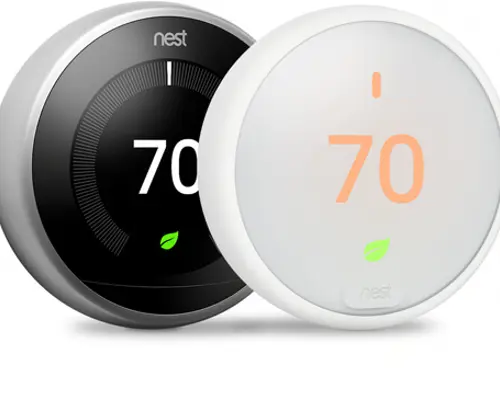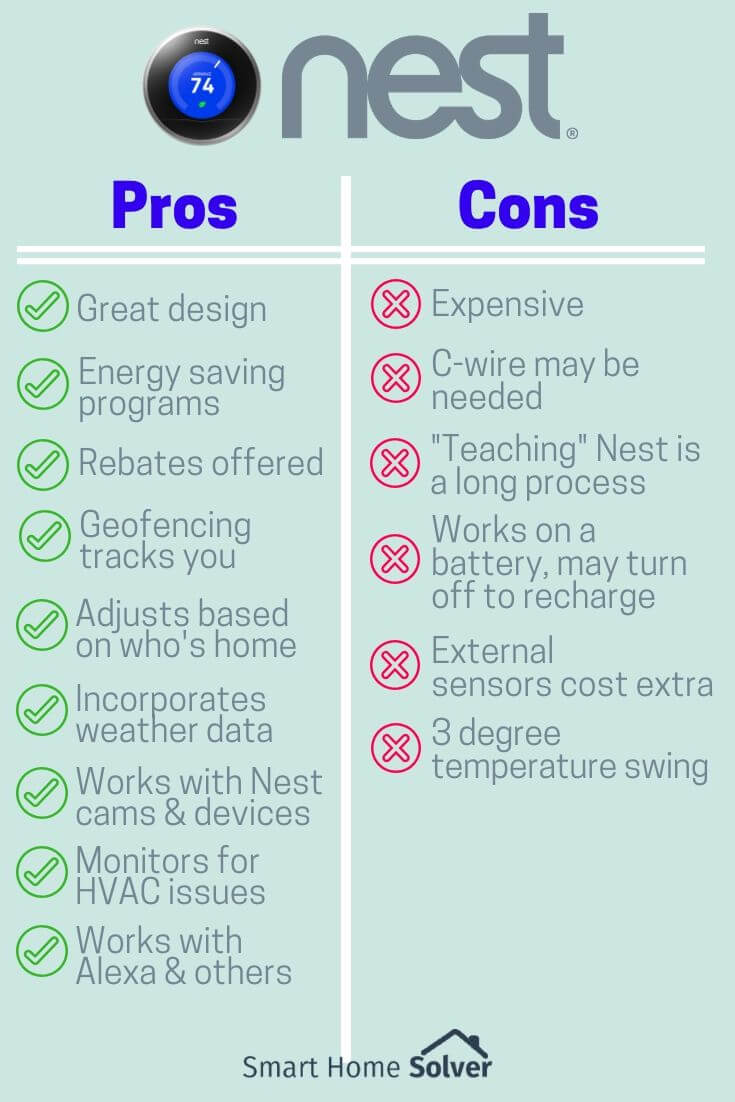Nest thermostats are popular for their smart features. But, are they bad for HVAC systems?
Many homeowners love the convenience of Nest thermostats. They offer smart temperature control and energy savings. But there are concerns about their impact on HVAC systems. Some say they can cause problems, while others see no issues. This debate can confuse anyone thinking about installing one.
Understanding the pros and cons is key. In this blog, we will explore if Nest thermostats are truly bad for HVAC systems. We aim to give you a clear picture. Let’s dive into the details and clear up the confusion.
Introduction To Nest Thermostats
Nest Thermostats have gained attention in recent years. These devices promise to make homes more energy-efficient. They also offer modern conveniences and smart technology.
What Is A Nest Thermostat?
A Nest Thermostat is a smart thermostat. It learns your schedule and preferences. Then, it adjusts the temperature automatically. This device connects to your home’s Wi-Fi. It can be controlled through a smartphone app.
Here are some key features:
- Auto-Schedule: Learns and adapts to your schedule.
- Remote Control: Manage the thermostat from anywhere using a smartphone.
- Energy History: Shows how much energy you use.
- Home/Away Assist: Adjusts temperature based on your presence.
Popularity And Adoption
Nest Thermostats have become very popular. Many homeowners are adopting this technology. They appreciate the convenience and potential energy savings.
Some reasons for their popularity include:
- Energy Efficiency: Helps reduce energy bills.
- Ease of Use: Simple to install and operate.
- Smart Features: Integration with other smart home devices.
- Modern Design: Sleek and stylish appearance.
Many people are switching to Nest Thermostats. They see the benefits in their daily lives.

Credit: www.ars.com
How Nest Thermostats Work
Nest Thermostats are smart devices designed to enhance HVAC systems. They use advanced technology to manage and optimize your home’s heating and cooling. Understanding how Nest Thermostats work can help you decide if they are right for your HVAC system.
Smart Features
Nest Thermostats come with a variety of smart features. These features make them a popular choice among homeowners.
- Auto-Schedule: The thermostat learns your schedule and adjusts the temperature accordingly.
- Remote Control: You can control the thermostat from your phone or tablet.
- Home/Away Assist: It automatically adjusts the temperature when you leave home.
These features are designed to improve comfort and convenience. The thermostat learns your preferences over time. This reduces the need for manual adjustments.
Energy Efficiency
One of the key benefits of Nest Thermostats is their focus on energy efficiency. They help you save money on energy bills.
| Feature | Description |
|---|---|
| Energy History | Shows you how much energy you’ve used. |
| Leaf Icon | Appears when you choose a temperature that saves energy. |
| Monthly Reports | Provides insights into your energy usage. |
These tools help you understand and manage your energy consumption. By making small changes, you can achieve significant savings. Nest Thermostats encourage energy-efficient practices. They make it easy to reduce your carbon footprint.
Potential Issues With Hvac Systems
Nest thermostats are popular for their smart features. Yet, they may have issues with HVAC systems. These problems can affect the performance and lifespan of your HVAC units.
Compatibility Concerns
Nest thermostats might not work well with all HVAC systems. Some systems need specific wiring that Nest does not support. This can lead to poor performance. Your HVAC system may not run efficiently. This can cause higher energy bills and discomfort.
Installation Challenges
Installing a Nest thermostat requires some technical knowledge. Incorrect installation can harm your HVAC system. You may face issues like short cycling or system failure. Professional installation is often recommended. This ensures the thermostat and HVAC system work well together.

Credit: smarthomesolver.com
Common Problems Reported
Nest Thermostats have gained popularity for their smart features and energy-saving capabilities. Yet, users have reported several issues. Understanding these can help you make an informed decision. Below, we discuss some common problems reported by users.
System Short Cycling
One common issue reported is system short cycling. This happens when the HVAC system turns on and off frequently. It can cause wear and tear on your system. Over time, this can reduce the lifespan of your HVAC unit.
Short cycling can also increase your energy bills. The system uses more energy starting up than running consistently. This can be frustrating for those looking to save money with their Nest Thermostat.
Inconsistent Temperatures
Another issue is inconsistent temperatures. Users have reported that their home does not maintain a steady temperature. This can be uncomfortable, especially during extreme weather.
Inconsistent temperatures can be caused by several factors. Incorrect thermostat placement, poor HVAC system compatibility, or faulty sensors could be to blame.
To help you understand these issues better, here is a table summarizing the problems:
| Problem | Description | Potential Causes |
|---|---|---|
| System Short Cycling | Frequent on/off cycles | Wear and tear, higher energy bills |
| Inconsistent Temperatures | Unsteady home temperature | Incorrect placement, poor compatibility, faulty sensors |
Addressing these issues can help you get the most out of your Nest Thermostat. Knowing the potential problems can aid in troubleshooting and improving your system’s performance.
Impact On Hvac System Lifespan
Many homeowners worry about the impact of Nest thermostats on their HVAC systems. These smart devices offer convenience and efficiency. But do they cause wear and tear? Understanding their impact is crucial for any homeowner.
Wear And Tear
Smart thermostats like Nest often cycle HVAC systems more frequently. This frequent cycling can lead to increased wear and tear. The constant switching on and off may shorten the system’s lifespan. Over time, components can degrade faster.
Frequent adjustments to the temperature may also stress the system. The system works harder to maintain a consistent temperature. This extra effort can cause parts to wear out sooner. It’s important to monitor your system’s performance.
Maintenance Requirements
Smart thermostats may require additional maintenance. Regular HVAC check-ups become even more important. Ensure that all components are in good working order. This helps prevent unexpected failures and extends the system’s life.
Keep an eye on energy savings and adjust settings as needed. Proper use can minimize the impact on your HVAC system. A well-maintained system runs more efficiently. This can counteract some of the wear caused by frequent cycling.
Expert Opinions
Understanding the impact of Nest Thermostats on HVAC systems requires insights from experts. Opinions from HVAC professionals and tech industry experts provide a comprehensive view. This helps homeowners make informed decisions.
Hvac Professionals
Many HVAC professionals have shared their thoughts on Nest Thermostats.
- Compatibility Concerns: Some HVAC experts highlight compatibility issues. Older systems may not support smart thermostats.
- System Wear and Tear: Frequent on-off cycles can increase wear and tear. This might shorten the lifespan of HVAC units.
- Installation Challenges: Proper installation is crucial. Incorrect setup can lead to inefficiencies and potential damage.
Tech Industry Insights
Tech industry experts also weigh in on the Nest Thermostat debate.
| Pros | Cons |
|---|---|
| Energy Savings | Potential Compatibility Issues |
| Smart Features | Possible Increased Wear |
| Remote Control | Requires Wi-Fi |
These insights help users understand the potential benefits and drawbacks. While tech experts praise smart features, they also note possible challenges. Energy savings and remote control are significant advantages. Yet, compatibility and increased wear are concerns.
Homeowner Experiences
Many homeowners have shared their experiences with Nest Thermostats. These insights help others decide if Nest is right for their HVAC systems. Let’s dive into the feedback from real users.
Positive Feedback
Some homeowners rave about their Nest Thermostats. They praise its user-friendly design and energy-saving features. Here are some of their experiences:
- Energy Savings: Many users report lower energy bills. The thermostat adjusts to their routines. It learns when they are home or away.
- Smart Features: Homeowners love the smart scheduling. The thermostat programs itself. It even suggests ways to save energy.
- Remote Control: Controlling the thermostat from a phone is a big plus. Users can adjust the temperature from anywhere.
Negative Feedback
Not all feedback is positive. Some homeowners face issues with Nest Thermostats. Here are some common complaints:
- Compatibility: Some HVAC systems don’t work well with Nest. Users report malfunctions and frequent repairs.
- Installation: The installation process can be tricky. Some users need professional help. Others struggle with the setup themselves.
- Connectivity Issues: Some users face problems with Wi-Fi connectivity. This affects the thermostat’s performance and smart features.
Tips For Proper Integration
Integrating a Nest thermostat with your HVAC system can be beneficial. Yet, proper integration is key to avoid potential issues. Here are some essential tips to ensure your Nest thermostat works seamlessly with your HVAC system.
Professional Installation
Opt for professional installation to ensure compatibility. HVAC systems are complex. A trained technician can handle the intricacies. They can connect the wires correctly and configure the system settings. This avoids common pitfalls and ensures smooth operation.
Regular Maintenance
Regular maintenance is crucial for both your HVAC system and the Nest thermostat. Schedule annual check-ups with a qualified technician. They can inspect and clean components. This helps to identify and fix any issues early. Keep the firmware of your Nest thermostat up to date. Updates often include bug fixes and new features.
Alternatives To Nest Thermostats
Are you worried about the impact of Nest Thermostats on your HVAC system? You’re not alone. Many homeowners seek alternatives to Nest Thermostats to ensure their HVAC systems operate smoothly. Below, we explore some viable options.
Other Smart Thermostats
Smart thermostats offer advanced features. They can help you save energy and make your home more comfortable. Here are some popular choices:
- Ecobee SmartThermostat: This thermostat comes with built-in Alexa. It can integrate with many smart home systems. It also offers room sensors for better temperature control.
- Honeywell Home T9: This option includes smart room sensors. It works with Alexa and Google Assistant. It also provides advanced scheduling features.
- Sensi Touch Smart Thermostat: This thermostat offers a sleek touch screen interface. It supports geofencing and works with most smart home systems.
Traditional Thermostats
Not everyone needs a smart thermostat. Traditional thermostats can be simpler and more reliable. Let’s look at some options:
| Thermostat | Features |
|---|---|
| Honeywell Home RTH111B | Basic control, non-programmable, easy to use |
| Emerson 1F83C-11NP | Programmable, large display, battery-powered |
| LuxPRO P711 | Non-programmable, simple dial control, affordable |
Traditional thermostats are often easier to install. They do not require Wi-Fi or complex settings. They provide reliable temperature control without the need for tech-savvy knowledge.

Credit: www.reddit.com
Frequently Asked Questions
Do Nest Thermostats Harm Hvac Systems?
No, Nest Thermostats do not harm HVAC systems if properly installed.
Can Nest Thermostats Cause Hvac Issues?
Improper installation might cause issues. Professional installation is recommended for best results.
Are Nest Thermostats Compatible With All Hvac Systems?
Nest Thermostats work with most HVAC systems. Check compatibility on the Nest website.
How Do Nest Thermostats Affect Hvac Efficiency?
Nest Thermostats can improve HVAC efficiency by learning your schedule and adjusting temperatures.
Do Nest Thermostats Void Hvac Warranties?
No, using a Nest Thermostat typically does not void HVAC warranties. Check with your manufacturer.
Conclusion
Nest Thermostats can impact HVAC systems both positively and negatively. Proper installation is crucial. Regular maintenance helps avoid potential issues. Understanding your HVAC system’s needs is key. Compatibility matters for efficient operation. User-friendly features can enhance comfort and savings. Always consult a professional for advice.
Careful use ensures long-term benefits. Balancing technology and system requirements is essential. Make informed decisions for your home.
